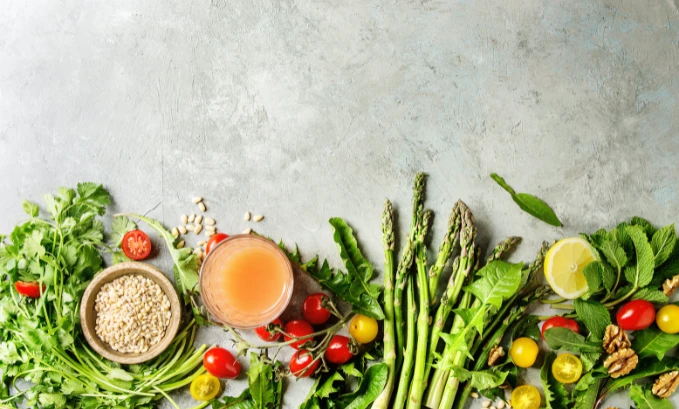Why Vitamin B12 Matters More Than You Think
An indispensable water-soluble vitamin, B12 – also known as cobalamin – helps to maintain normal brain function, synthesis of DNA, and RBC production. Among vitamins, vitamin B12 is special since it cannot be found in plant sources; vegetarians especially have to make sure they eat enough animal products such meat, dairy, and eggs to reach their daily advised consumption. Inadequate B12 can cause anemia, neurological problems, and tiredness. B12 for vegetarians often can be found in fortified foods – such as plant-based milk and cereals or supplements – help them to satisfy their dietary needs and guarantee general health.
All living things depend on vitamin B12, but vegetarians particularly need it since it maintains healthy neurons, aids the brain function, and produces good red blood cells. Vegetarians run more risk of insufficiency unless they take supplements or closely plan their meals as vitamin B12 is largely found in animal products. Among the major health problems caused by deficit of B12 for vegetarians are numbness, cognitive impairment, and excessive tiredness that greatly affect daily performance. To satisfy nutritional needs and preserve best health, vegetarian-oriented diets and vegans should give fortified plant-based substitutes first priority or think about mic b12 injections near me.
What is Vitamin B12?
Commonly referred to as cobalamin, vitamin B12 is a water-soluble vitamin absolutely necessary for general health. It is necessary for the neurological system to be properly operating as well as for the red blood cells carrying oxygen all across the body. Vitamin B12 stimulates cell development and division as well as helping create DNA. It also facilitates the metabolism of proteins and lipids, therefore helping to produce energy. The body cannot synthesis vitamin B12; so, it must be acquired from food sources including meat, fish, dairy, or fortified foods.
Vitamin B12 is absorbed in the stomach and then proceeds convolutedly via the small intestine. It calls for the existence of intrinsic factor, a stomach-generated protein that helps the small intestine’s ileum absorb vitamin B12. Since most animal-based goods contain B12, vegetarians find it more challenging to get sufficient of it. Still, plenty of vitamin B12 for vegetarians can be delivered from meals including morning cereals, plant-based milk, and nutritional yeast—that is, from fortified foods. When combined with a good, well-balanced diet, these meals give a quick approach to satisfy your daily dietary needs and guarantee appropriate absorption.
Why Vegetarians Are at Risk of Vitamin B12 Deficiency
Vitamin B12 determines nerve function, red blood cell creation, and DNA synthesis. It comes from meals based on animals – meat, fish, eggs, and dairy – because animal gut flora generates it. Lack of microbiological mechanisms of synthesis makes plants almost ever B12. Vegans and vegetarians should eat fortified foods or supplements to prevent B12 shortages that could cause weariness, neurological difficulties, and other health issues.
Vegetarians and vegans both have to strictly monitor their B12 intake even though their methods are different. B12 is naturally found in dairy and eggs, hence vegetarians could find it more easily. The maintenance of B12 for vegetarians is consequently easier than that of vegans. Vegans, who give up all animal products, have to get their B12 and minerals from fortified meals. Often in order to stay healthy and prevent shortages, vegans must consume these replacements.

Dairy and eggs are great sources of B12 for vegetarians; so, their diets greatly affect their B12 intake. B12 among these products helps vegetarians satisfy their dietary requirements more easily than strict plant-based diets. Including milk, cheese, and yogurt will provide vegetarians enough B12 without pills. A well-planned diet is nevertheless crucial to guarantee regular and enough intake of B12 for vegetarians even although deficiencies can cause weariness, neurological disorders, and other health issues.
Symptoms and Risks of B12 Deficiency
Particularly for vegetarians whose plant-based diets may not always include sufficient B12, insufficiency can cause several symptoms and health risks. Deficits present themselves as weakness, fatigue, hand or foot tingling or numbness. Deficiency of vitamin B12 for vegetarians can increase anemia, neurological diseases, cognitive issues including memory loss, and other effects. Vegetarians should eat meals strong in fortifying agents or supplements if they want to maintain B12 levels and lower their dangers.
In vegetarians, who might not get enough of this vitamin from diet, untreated B12 insufficiency can cause neurological and cognitive issues. B12’s necessary nature for brain activity can cause inattention, mood swings, memory loss, and depression. Extended lack could cause tingling, numbness, nerve injury, or balance difficulties. Since its symptoms mimic aging-related cognitive loss or chronic fatigue syndrome, B12 insufficiency is unfortunate sometimes misread or ignored.
How to Test for Vitamin B12 Deficiency
To find vitamin B12 insufficiency, a basic blood test gauges vitamin B12 levels. These tests gauge active and inactive forms of B12 levels overall. Doctors may test homocysteine levels and methylenemalonic acid (MMA) for a more exact diagnosis since they can point to B12 shortage. Low levels of B12 for vegetarians as well as meat-eaters produce anemia, which can be tested by either intrinsic factor antibody screening or a full blood count (CBC). Should a deficit be discovered, see a doctor to review the findings and choose the best course of action.
Sometimes a vitamin B deficiency calls for medical attention, particularly for vegetarians. Low B12 levels may be suggested by fatigue, weakness, numbness or tingling in the hands and feet, difficulties focusing, or pale and jaundiced skin; hence, medical treatment is advised. Eating less animal products makes vegetarians more prone to suffer B12 deficiency. It is advisable to check the levels of B12 for vegetarians as recommended by their doctor or yearly. Early identification and supplements help to avoid deficiencies.
Sources of Vitamin B12 for Vegetarians
To keep healthy, vegetarians must find dependable supplies of vitamin B12. For everyday meals, fortified foods make sense. Popular addition to pasta and salads is nutritional yeast, which has vitamin B12 content and cheesy taste. Often fortified with B12, almond, soy, and oat milks make increasing intake simple. This vital vitamin is common in breakfast cereals, plant-based burgers and sausages. For vegetarians, they provide B12 that is flexible and easily available, therefore boosting energy and neurological activity without animal sources.
Particularly those who find it difficult to eat enough, supplements enable vegetarians meet their vitamin B12 needs. Convenient and widely available in capsules, tablets, and gummies, oral B12 supplements are Sublingual vitamins – which dissolve under the tongue and might absorb more quickly – are preferred by certain persons. In case of extreme shortages or absorption problems, injectable B12 from a doctor comes in handy. These supplements maintain the availability of b12 for vegetarians, enhancing health and energy.
Though they are fermented and algae-based B12 sources, spirulina, chlorella, and tempeh might not be sufficient for dietary requirements. Mostly consisting of pseudo-vitamin B12, these meals are useless for the body. These analogues might prevent active B12 absorption even in vegetarian-friendly products, therefore influencing nutritional balance. Vegetarians should acquire B12 from either pills or fortified foods.
How Much Vitamin B12 Do You Need?
An indispensable vitamin, vitamin B12 for vegetarians is vital for preserving normal nerve function and red blood cell synthesis. B12 intake advised daily differs depending on age and stage of life. 0.4 micrograms daily is plenty for newborns up to six months; children aged one to three years need 0.9 micrograms daily. By the time people reach maturity, the advised consumption rises to 2.4 micrograms daily; somewhat larger quantities are advised during nursing (2.8 micrograms) and pregnancy (2.6 micrograms). Since B12 is mostly found in animal-based products, vegetarians especially need to be sure they obtain enough of this vitamin. Vegetarians have fantastic choices for meeting their B12 needs in fortified foods like cereals, plant-based milk, and supplements.
Usually eliminated through urine, vitamin B12 is water-soluble, hence even at greater dosages it is usually safe. Since no toxicity has been connected to too high consumption, B12 intake has no set upper limit. Stories about excessive dosages, especially those of extreme side effects, are mostly unverified. Some people, meantime, can have modest responses including stomach trouble or skin rashes. High-dose supplements can be a handy approach of getting B12 for vegetarians to guarantee sufficient amounts, especially for those with absorption problems, but always see a healthcare practitioner for specific guidance.
Final Tips for Staying Healthy as a Vegetarian
Maintaining long-term vegetarian health calls for careful planning and frequent monitoring to satisfy dietary needs. Getting adequate vitamin B12 for vegetarians found in animal sources – is a major worry for those on plant based diet. Vegetarians might be able to avoid deficiencies with fortified foods including plant-based milk, cereals, and nutritional yeast. For general health, a balanced, varied diet high in fruits, vegetables, whole grains, legumes, nuts, and seeds and frequent blood tests to track nutrient levels are absolutely necessary. Customizing diets for best nutrition can be done with advice from a doctor or dietitian.
Ultimately, vegetarian health depends critically on a balanced diet and way of living. It is crucial to receive adequate amount of B12 for vegetarians since it helps create energy and preserve neurological ability. Use fortified foods and supplements in line with a diversified, nutrient-dense diet including fresh produce, whole grains, and plant-based proteins. Moreover enhancing well-being include fitness, water, and conscious eating. As a vegetarian, routinely seeing a doctor to modify your diet and track B12 levels will help you stay healthy.


Comments